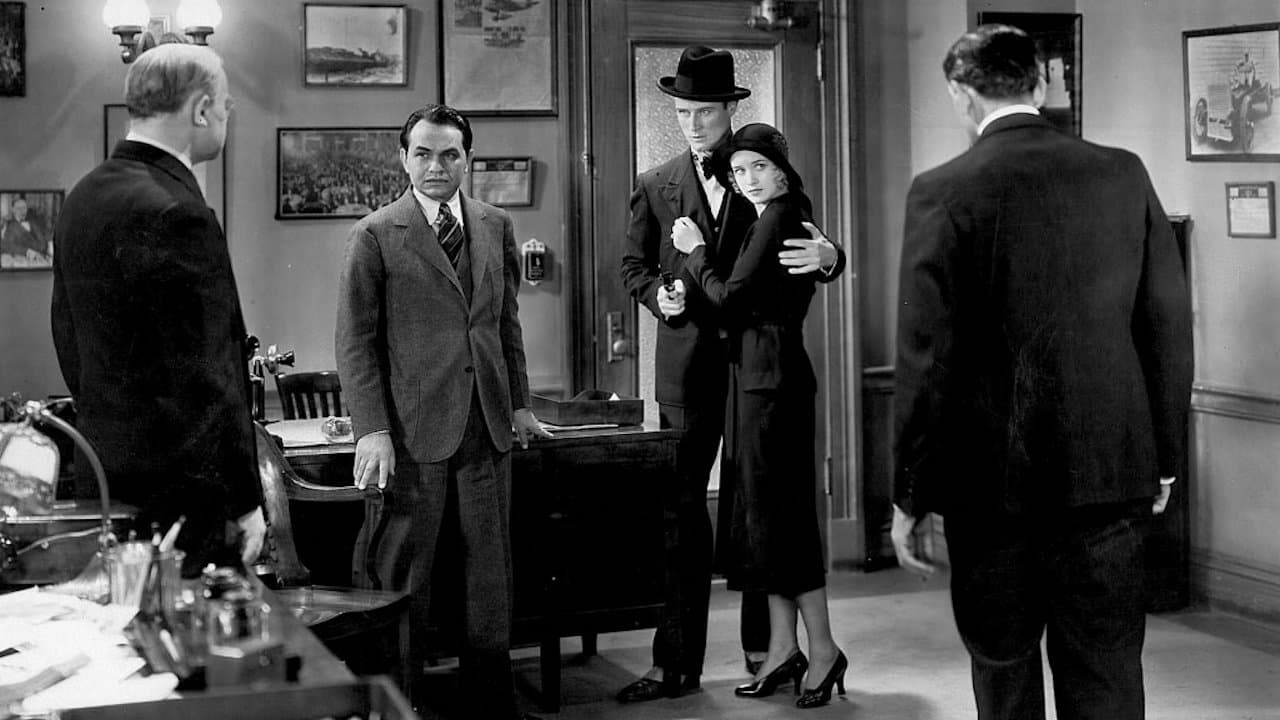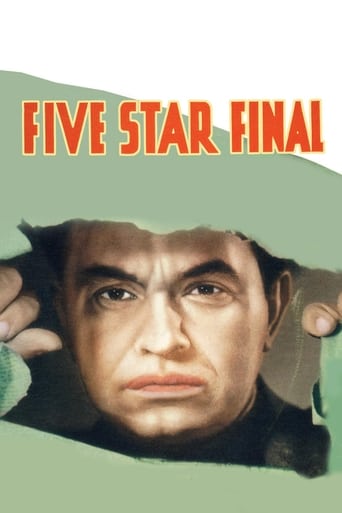Actuakers
One of my all time favorites.
Quiet Muffin
This movie tries so hard to be funny, yet it falls flat every time. Just another example of recycled ideas repackaged with women in an attempt to appeal to a certain audience.
Beulah Bram
A film of deceptively outspoken contemporary relevance, this is cinema at its most alert, alarming and alive.
Billy Ollie
Through painfully honest and emotional moments, the movie becomes irresistibly relatable
jacobs-greenwood
Directed by Mervyn LeRoy, with an adaptation by Robert Lord, this newspaper drama was nominated for Best Picture of 1931 by the Academy of Motion Picture Arts and Sciences. The most notable character in the film is played by Edward G. Robinson who, along with his performance in another LeRoy picture that same year (Little Caesar (1931)), showed signs of his tremendous versatility early in his 5+ decade long film career. The fact that Robinson was NEVER EVEN NOMINATED for an acting Oscar is perhaps the greatest of the many oversights in the Academy's storied history.Joseph Randall (Robinson) is an editor for the Gazette, a rather trashy paper (the Gazette) he'd begun to clean up when his bosses - owner Hinchecliffe (Oscar Apfel), Robert French (Purnell Pratt) and Brannegan (Robert Elliott), in charge of circulation & advertising - convince him to find out "what ever happened to" Nancy Voorhees (Frances Starr), a paroled murderess who'd killed her husband 20 years ago, and make a week-long story of it to sell more papers.Aline MacMahon is also notable, in her film debut, serving as Randall's secretary with a conscience that reflects his own, which is (at least, temporarily) buried by the fear of losing his job. Another colorful character is George Stone, who plays a slimy newspaper "handyman" in Randall's employ that finds other methods, including some outlandish ideas, to enhance the Gazette's circulation.As it turns out, the murderess's daughter (the beautiful 17 year old Marian Marsh) is about to marry the son (Anthony Bushell) of wealthy parents. However, neither the murderess's daughter nor her prospective in-laws know of her mother's past because Voorhees had remarried (H. B. Warner), which changed her name to Townsend. The daughter doesn't even know that Townsend isn't her father, a superfluous plot point that is never learned nor exploited.Randall uses a new, well endowed reporter Kitty Carmody (Ona Munson) and his wily, though frequently drunken investigative veteran "Reverend" Isopod (Boris Karloff) to find the missing murderess and get today's story. Naturally, printing the story will affect the interested parties lives irreversibly, so the former murderess and her current husband do everything they can to appeal to Hinchecliffe and Randall to stop the "five star final" (the last edition of the day).Of course, the newspaper men run with it and achieve their desired circulation results, which prompts even more drastic actions from (eventually) each of the three Townsends. The scenes in which Randall realizes he can't wash his hands of his responsibility in the tragedy that befalls the Townsends are Robinson's, and the film's, most powerful.Too bad the editors of today's formerly respected big name newspapers don't (evidently) feel the shame, nor the guilt, for what their papers deem fit to print in this day and age!Remade as a B movie five years later as Two Against the World (1936), which is also shown as One Fatal Hour (1936) on TCM.
wes-connors
Ordered to up the sleaze quotient for increased circulation, New York "Gazette" newspaper editor Edward G. Robinson (as Joseph W. Randall) dredges up the story of a local woman who shot her adulterous lover dead, and earned a scandalous reputation. The serialization sells newspapers, but the subject Frances Starr (as Nancy Voorhees) has changed her life with second husband H. B. Warner (as Michael Townsend); moreover, the couple has kept the sordid past secret from pretty daughter Marian Marsh (as Jenny), who is about to marry handsome high society's Anthony Bushell (as Phillip Weeks). When boozy staff reporter Boris Karloff (as Isopod) absconds with Ms. Marsh's picture, the consequences could prove tragic...This is a fine if dated early "talkie" with a message still reverberating. The ensemble cast, sometimes venturing into melodramatics with understandable verve, is fun. Successful Broadway star Aline MacMahon makes an impressive film debut as Mr. Robinson's lovelorn secretary. Director Mervyn LeRoy moves it nicely and includes some rich "split-screen" work.******** Five Star Final (9/10/31) Mervyn LeRoy ~ Edward G. Robinson, Frances Starr, Aline MacMahon, Boris Karloff
blanche-2
The exploitativeness of tabloids is always a good subject, even back in 1931. "Five Star Final" is about a ruthless editor (Edward G. Robinson) who hounds a woman involved in a 20-year-old murder with tragic results. The film sports a good cast, including Boris Karloff, Mae Marsh, Ona Munson, Aline McMahon, and H.B. Warner.Robinson, as the editor, decides to do a series on an old murder and track down one of the people involved, Nancy Vorhees. She is now married with a daughter about to get married. The film looks at the effect it has on the lives of everyone in the family.I am not as enthusiastic about this film as some of the posters here, though I imagine it was very hard-hitting for 1931. The acting is very melodramatic, and while I appreciated the devastating effects of the story, I really thought a bad situation was made much worse by the behavior of the girl's parents at the end of the film. It wasn't until the mid-thirties that the class system in America began to disintegrate, so it's still quite evident here, with the way the young woman's future in-laws react to the scandal and Robinson's analysis of black readers.At the time the film was made, any publicity was looked down upon - today it's considered a great thing, though I don't suppose involvement in a murder would be. You might get a book deal out of it, though, and a TV movie. Nancy Voorhees today could have given the paper an exclusive interview and become a sympathetic character. But it was such a disgrace, and people seemed to have no understanding or compassion.It's hard to judge the performances because the acting style and the dialogue are so different from even a few years later. Of all of them, Aline McMahon, as the cynical secretary, comes off the best.Definitely worth seeing.
tarmcgator
As a former jackal of the press myself, I get a big kick out of newspaper movies. FIVE STAR FINAL is one of the best, ranking alongside THE FRONT PAGE and its various remakes, CITIZEN KANE, MEET JOHN DOE, the little-known DEADLINE, U.S.A. (with Bogart as a crusading editor), ALL THE PRESIDENT'S MEN, and ABSENCE OF MALICE. (I'm probably leaving out a couple of other favorites but those are the ones that come to mind at this writing.) This film has three things going for it. The story, based on a play that opened in 1930, was probably more relevant in that era than today. Most news outlets (excluding those that are exclusively on the internet) now are more respectful of the privacy of private citizens than are the employees of the Evening Gazette; and I've never known a reporter or photographer who lied about being one to get a story. But an intimate followup on the "crime" committed twenty years earlier by Nancy Voorhees -- and for which she was not convicted -- was the type of sensational bread-and-butter that certain sleazy newspapers pursued before World War II. (Today's sleazy tabloids, print and electronic, are far more likely to go after real celebrities who hunger for any kind of publicity. And many so-called internet journalists, without training, editing, or professional standards, are much worse.) Though this kind of yellow journalism is an aberration in today's newspaper industry, in 1930 it was all too prevalent, especially in the cut-throat world of New York City's intensely competitive dailies. It's very representative of the era, and on top of that it's just a good yarn.The supporting actors are extremely well-cast. Aline MacMahon as the editor's lovelorn secretary, George E. Stone as the paper's staff bootlegger and fixer, H.B. Warner as the understanding husband of Nancy Voorhees, and Oscar Apfel as the villainous publisher Hinchcliffe are particular standouts. It's interesting to see Boris Karloff in a pre-FRANKENSTEIN role, though it's difficult to think of him as a womanizing reporter. Some may find the acting in the film too stagy and overdone, but if you can adjust your expectations and accept the dated style, it works very well.Then there's Eddie G. He had just achieved stardom with LITTLE CAESAR when FIVE STAR FINAL was made, and despite the excellent competition he commands the screen as the Gazette's editor, who is both repelled by the betrayal of his journalistic ideals and excited by the repellent story he's ordered to pursue. The hand-washing (which actually occurs only about three times in this 90-minute movie) is a perfect metaphor for his guilt, and his reliance on the bottle was (maybe still is) all too common an occupational hazard for newspapermen of this era. At film's end, we finally get the emotional explosion that has been building in Robinson throughout the movie. Very satisfying. What a shame this actor never received even an Oscar nomination, much less a statuette (except for an honorary one awarded after his death.)FIVE STAR FINAL was nominated for the best picture Oscar in 1931 but lost out to CIMARRON. Guess which film has aged less. Despite the dated setting and story, FIVE STAR FINAL still crackles with passion and humor. It is an enduring example of what Warner Brothers accomplished, altogether unintentionally, in documenting America in the 1930s. I can understand that it's not to all tastes, but this jackal of the press finds in FIVE STAR FINAL characters and issues that still resonate with journalists today.

